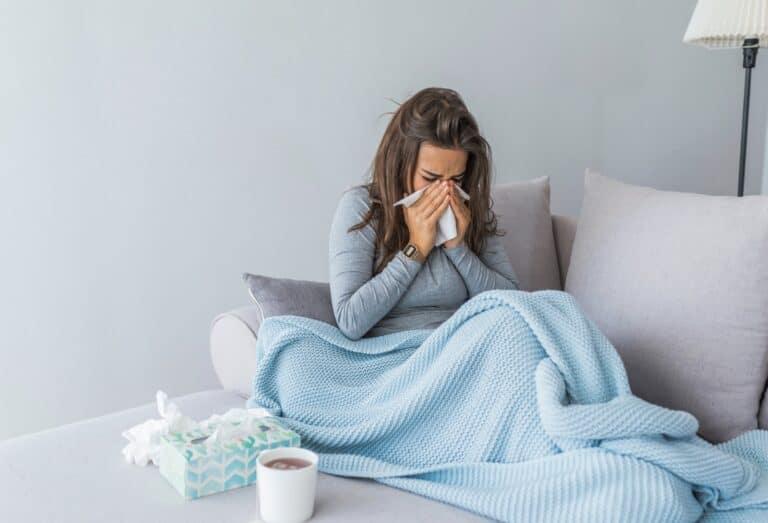
It’s flu season and there seems to be no shortage of misinformation and bad advice when it comes to dealing with the flu and the flu shot. Here, we’ll discuss some common flu myths and whether they hold any truth.
Man, flu does not exist! True.
There is no evidence to suggest anything such as man flu. In most cases, the symptoms are similar to a common cold (sneezing, coughing, head cold and runny nose) and not caused by the influenza virus. However, recent medical research does indicate that men take longer to recover from colds and flu and have more side effects than females, hence why the term “man flu” was created.
Green mucus means a chest infection. False.
Green phlegm or snot does not mean you need a course of antibiotics to get better. Most infections that generate lots of phlegm and snot are viral illnesses and will improve on their own, although you can expect to feel pretty poorly for a few weeks. Antibiotics are prescribed to treat bacterial infections but aren’t effective in combatting viral infections that cause the flu.
You can only catch a cold through coughs and sneezes. False.
There are a number of steps you can take to protect yourself during flu season besides vaccination. Avoid contact with people with the flu, wash your hands frequently and use hand sanitisers. The same recommendations for avoiding coronavirus (covid-19 vaccines are recommended to prevent the serious complications caused by coronavirus infection). Consider taking antiviral medications if you were exposed to the flu before being vaccinated.
Chicken soup cures colds. False.
Hot liquids can help to soothe a sore throat and provide much-needed fluids. But chicken soup has no other magical qualities to help fight the flu. Warm liquids may help speed up mucus movement through the nose and prevent dehydration, but there is no evidence to show that chicken soup will help cure a cold.
Going out with wet hair will give you a cold. False.
Viruses usually spread colds and flu, so going out with wet hair would not usually cause you to get a cold. However, going out with wet hair isn’t advised, especially in cold weather.
Vitamin C won’t stop a cold. True.
It won’t stop it, but it will help speed up your recovery and boost your immune system.
Feed a cold, starve a fever. False.
This is an old wives’ tale and isn’t true. The body needs to be fed with food and drink full of nutrients to help it recover, so cutting down could take the recovery period longer.
It can be too late to get the flu vaccine. False.
The best time to have a flu jab is in Autumn, but having one later than this can still help you from getting certain strains of the virus.
Immunity from the flu vaccine declines as time passes, so vaccination every year is critical to provide the best protection. The vaccine may change each year to match circulating flu viruses. Having had the flu vaccination last year may not protect you from the flu this year.
The flu vaccine comes as an injection, but for children, it is a nasal spray (sprayed into the nose). Most people who suffer from allergies can get an influenza vaccine without problems. If you have had a severe allergic reaction to a previous dose of influenza vaccine or any part of the vaccine, talk to your health care provider first.
Another common myth is that you can catch the flu from the flu vaccine. It is impossible to get the flu from the vaccine because it doesn’t contain live viruses.
Flying will increase your risk of catching a cold or flu. Possibly.
Being in confined spaces close to people who may have a cold or flu makes your chances of catching it higher. Planes recycle germs, so sadly you could be more susceptible when flying.
The flu is simply a really bad cold. False.
Flu symptoms are much more than a common cold and usually take a person much longer to recover.
The flu may cause bad cold symptoms, like high fever, sore throat, headaches and body aches, runny nose, sneezing, hoarseness and cough. Still, according to the CDC, the 2019-20 flu season in the U.S. led to 18 million medical visits, 24,000 deaths and 410,000 hospitalisations.
While complications from the flu are most dangerous for the very young, elderly or those with underlying health conditions, flu can hit strong and healthy people hard too. It’s more than a heavy cold. Also, healthy people can spread the virus to others at increased risk.
I have had the flu, so I don’t need the jab. False.
Many flu viruses circulate all the time. Catching the flu once doesn’t mean you won’t catch a different flu virus again. Being vaccinated improves the chance of you being protected from the flu. The vaccine may change each year to match circulating flu viruses.
Also, being vaccinated helps you stop the virus from infecting your loved ones who may have medical conditions, have vulnerable immune systems and are at increased risk of serious complications. This is especially true if you work in health care or care for high-risk people.
Other groups at higher risk include young children, pregnant women. The CDC (Center for Disease Control and Prevention) recommends that all pregnant women get vaccinated against the flu, postpartum women up to 2 weeks after delivery, older adults, people with certain chronic medical problems, people who live in nursing homes and certain racial and ethnic minority groups.
Sources
Medical Disclaimer
NowPatient has taken all reasonable steps to ensure that all material is factually accurate, complete, and current. However, the knowledge and experience of a qualified healthcare professional should always be sought after instead of using the information on this page. Before taking any drug, you should always speak to your doctor or another qualified healthcare provider.
The information provided here about medications is subject to change and is not meant to include all uses, precautions, warnings, directions, drug interactions, allergic reactions, or negative effects. The absence of warnings or other information for a particular medication does not imply that the medication or medication combination is appropriate for all patients or for all possible purposes.








